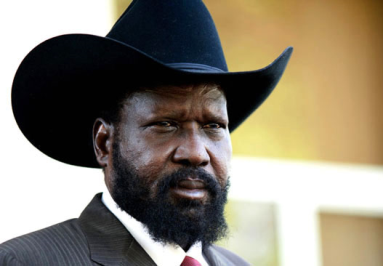Kiir says people will decide suitable system of governance
April 27, 2016 (JUBA) – South Sudan’s president, Salva Kiir said the issue of federalism and democracy be decided by the people and not the government or external pressure.

“This thing [federalism ]should not be decided by myself or by the government because of external pressure. It is the demand of the people and they should be allowed to take part in the process”, president Kiir said on Wednesday.
He added, “They [people] are the one to decide the suitable system of governance they want”.
The South Sudanese leader made these comments in what is seen as an indirect reaction to remarks attributed to the head of the United Nations peacekeeping operations, Herve Ladsous who described creation of 28 states as a conflict drivers and aske members of the UN Security Council, African Union and regional leaders to persuade Kiir to drop the idea or allow the matter be discussed with participation of the people.
The president has not yet discussed in person the issue of states with Machar, who seeks structuring of the system of governance and the country to adopt federalism.
Critics have expressed fear that the government and the president may mobilise a certain section of the society, particularly members of his ethnic Dinka to continue to support the status at the expense of reforms, including a popular desire to scrutinise the 2011 Transitional Constitution which placed too much power in the hands of President Kiir, who wanted an executive president with sweeping powers, including powers to sack elected state governors and dissolve local legislative assemblies.
Other observers, however, say the issue of federalism is a sensitive matter in the country that requires an all-inclusive participation of the people before it is finally adopted.
Several activists have also argued that the creation of more administrative units through the presidential establishment order has nothing to do with federalism. They argue that federalism allows the country embrace democratic ideals and the best practices that are a cornerstone of national identity. But as the opponents gained power under president Kiir, the balance tipped and the pious now feel any change must reflect their interest.
Many people have also argued that in a country which fought itself, and where citizens aspire to coexist peacefully, the issue of federalism could be discussed in a rational way.
South Sudan is so profoundly polarized, so riven by mistrust between supporters and opponents of the government, that the topic has sparked fears and debates. One side says it is a reflection of the fact that the country’s populatolion is about 80% illiterate.
(ST)
